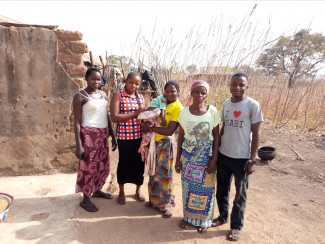
Who are you?
I guess it all started with me, Bartholomew Osegbe.
Or did it start with Martin Hoger?
I had come to Prague in 2006 to study Chemical Engineering. One day on the subway, this guy came up to me and asked me if like rap music. What? Because I’m black? I’m Nigerian. Did you ever listen to Nigerian music?
But Martin became a good friend, and he and the people around him helped me to find Jesus. Because of them I even met my wife, Silvana, who is with me in everything. My baptism was on January 20, 2009.
Silvana and I are not alone anymore.
There is Ignatius, my younger brother, whom I especially value for his critical thinking.
And Musa, my big-hearted Nigerian friend, who took me to his home village to start a church there.
And there are the local pastors back in Nigeria. Pastor Boniface, Pastor Emma, Pastor Andy, amazing guys who love God and other people. They just couldn’t stand the Nigerian church system anymore.
What do you want to see?
We are Nigerians. We have no illusions about our country.
The two B´s always have to go together: Bible and Bread.
We have to teach the people we reach out to how to fish. If we do not help them to be financially independent, they will create churches to make money for themselves.
Nigeria has too much of this already.
What I learned in Prague and now in Munich is how to make disciples. The churches we want to start will not have a superstar-pastor who is the sole communicator with God. That creates only religious consumerism. In several of the villages people have come to Christ over the last couple of trips. We want to disciple them so they can take the gospel to other places. Our dream is to empower everyday people.
How did you get this idea?
It all started in 2017. I was praying, when I heard the voice of God, loud and clear: Step out of your comfort zone. I knew exactly what it meant. I had to start talking to people in the streets. Because Silvana and I live in Munich, I started there.
Nigeria was a bit harder for me. Until then, whenever I went home to see my family, I just stayed at the house and enjoyed the comfort of my privacy. But after God challenged me, I knew that when I would go back to Nigeria the next time, I couldn’t hide anymore. That’s why, when I arrived in Lagos, I went straight to the university to find someone to share Jesus with.
When I went for my next trip in February 2018, the driver who picked me up from the airport was God-sent. We talked, and he told me about his faith in Christ, the village he came from, and that he wanted to liberate his village people for Christ. This actually was Musa. This is how the whole work into the villages started.
What challenges do you expect?
The villages we have started to go into, are close to Keffi, in the state of Nasarawa.
Lots of Muslims try to escape from the violence in their home territories in the north and come into so-called safe zones. Boko Haram, the jihadist group fighting against the Nigerian government, targets not only Christians, but also Muslims whom they consider not strict enough. And because of political influences behind the scenes, these safe zones have become dangerous.
Most of the people in the villages are farmers who can’t read or write. Pastor Andy and Pastor Emma translate whatever we do from English to Hausa. Still, not everybody we reach out to, can understand us, because a lot of people only speak their own local dialect.
Another challenge in Nigeria is the church culture that has come before us. People expect us to want them to join our church and later collect offerings for ourselves. We have to prove that we are different and that we have come to make a difference in their lives.
What are you going to do?
In Germany I learned how helpful it is to set goals together. We as a team are going to pray about which goals we should set, how to plan to reach them, and to be transparent about our successes and failures.
We also know that we need to reach other people groups in Nigeria: more than just the people in the villages. We need to find people with a passion to reach university students.